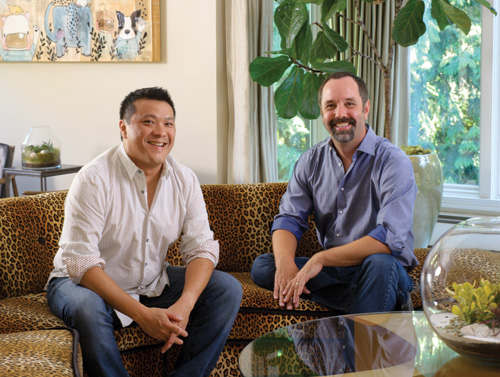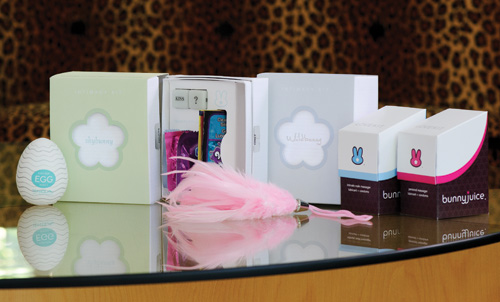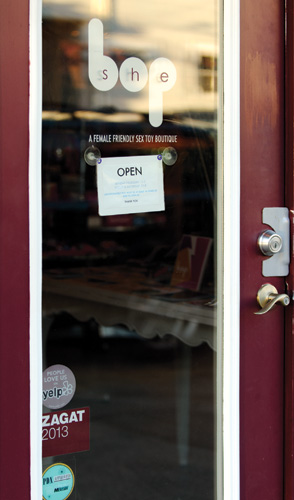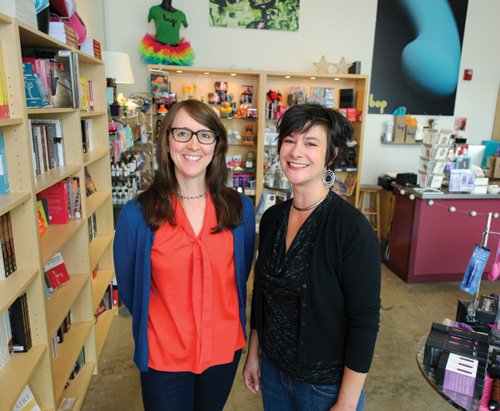Oregon’s pleasure industry is expanding by innovating and catering to alternative-market segments, including sustainably minded and female consumers.
 |
“Tana the Tattooed Lady” at Devils Point, where stripping is supplemented by customers onstage singing karaoke.// Photo by Joseph Eastburn |
A strip club is a strip club is a strip club. Except perhaps in Portland. Long touted as the exotic dance capital of the U.S., Portland has so many clubs — now more than 60 — that a dark stage, a dance pole and supple women removing their clothing are no longer enough to guarantee patronage.
Instead, clubs are driven to differentiate and to tap new customer streams — similar to many consumer industries. While much of the coverage of the sex business in mainstream media portrays Oregon’s I-5 corridor as a hub for prostitution and sex trafficking, there’s also a legal and flourishing side to the sex industry. Its backbone may once have been strip clubs, but it is moving beyond these to experiment with other products, services and client bases. In true Oregon style, the legal sex industry here gets its start from our state constitution, written to expressly safeguard manifestations of free speech. Now the pleasure industry is expanding by innovating and catering to alternative-market segments, including sustainably minded and female consumers.
Nationwide, the sex industry is realizing that women are an untapped resource, says Kassia Wosick, an assistant sociology professor at New Mexico State University, whose research focuses on gender and sexuality. Increased sex-product consumption by women is undeniable, Wosick says. In particular, “we see women consumers investing their money in the industry through sex-toy and novelty products.”
Such products are now available through Oregon startups such as Hood River-based Bunnyjuice and Good Clean Love out of Eugene. Online, Sean Suhl and Selena Mooney have also had success with their soft-core, membership-based online site called Suicide Girls, launched in Portland in 2001 and now located in Los Angeles. Specializing in alternative, goth, punk and indie female models, Suicide Girls gets millions of page hits per week and has spawned knockoff competitors. Then there’s Club Sesso, a Portland swingers club getting in on the diversification of the industry by catering to a sex-positive and youthful demographic.
These new business models do more than suggest the mainstreaming of the sex business and its growing attraction for women. They also point to an effort at reconciling a long-standing contradiction in American culture: between sex as either an expression of idealized romantic love or crude adolescent fantasy. That is, in the U.S., there is a common cultural impression that society is obsessed and oversaturated with sex. Yet the images and the products we’ve had available to consume, like strip clubs, have tended to be somewhat pubescent, aimed at the same younger-man’s demographic that drives mainstream Hollywood action films.
 |
Bunnyjuice founders Benton Wong and Tod Guenther.// Photos by Joseph Eastburn |
Today, however, competitive pressure in the sex industry has led to variety — and in Oregon, that variety comes with a distinctly Portlandia flavor. But first, some background: Oregon has earned a national, if dubious, reputation as a strip-club mecca, one that is good at delivering supply to a base demand. The state is second in clubs per capita, while Portland is first in strip clubs amongst the 50 largest U.S. cities — 9 per 100,000 inhabitants.
Strip clubs are a fantastically lucrative U.S. business segment, expected to take in $7.8 billion in 2013, according to market-research firm IBISWorld. And in Oregon, the free-speech guarantee in the state constitution is broader than the federal First Amendment, and several consecutive rulings by the Oregon Supreme Court continue to uphold our right not only to say and write what we want, but also to bare all, either on city streets à la the World Naked Bike Ride or in exotic dance locales around the state.
The result is a diverse and expanding array of offerings. The Portland Metro area, for example, sports a vegan strip club (Casa Diablo); juice-bar strip clubs marketing to the under-21 crowd (such as Jiggles in Tualatin); the nearly 60-year-old Mary’s Club, in business since 1954; and even Stripperoke, combining strippers with patrons singing karaoke (Devils Point).
“I thought it had potential — let’s make it friendly for everybody, throw some parties, and, oh, yeah, we also have naked girls onstage,” says Shon Boulden, 35, part-owner of Devils Point. In 2008 Boulden converted what was previously a simple dive bar at the Devil’s Point location in Southeast Portland into a strip club — expressly to avoid closure, he says.
At Devils Point, naked fire dancers were initially the novelty helping the club stay competitive. Outlawed in 2011 by new fire regulations, fire dancers were supplanted by Stripperoke, and the combination of stripping women with customers belting out popular tunes has earned Devils Point national notoriety.
The media attention has also helped attract a new clientele — women. “A lot of times you’ll see just as many females sitting at the ‘rack’ [clubs’ stage-side seating] as you do males,” Boulden says, adding that the formula for making money at these businesses hasn’t changed — alcohol sales and tips to dancers drive profits and income. Nevertheless, “Devils Point is not predominantly a male-oriented place.”
 |
Bunnyjuice kits include travel-size packets of massage oils and lubricants, together with condoms and compact sex toys such as pink feather ticklers.// Photo by Joseph Eastburn |
Strip clubs, massage parlors, adult-video and sex-toy stores have likewise historically catered to male sensibilities, but that is changing. The Internet is partly responsible, as the Web has made pornography practically unavoidable online, while nearly wiping out the DVD pornography market. And if 2007 Nielsen/NetReview survey figures are anywhere near correct, the Internet has brought more females in contact with porn. At the same time, says Wosick, women consume sex products and services differently than men — they are, for example, shier about online purchases and gravitate more toward Tupperware-style sex-toy parties. Now, she says, the industry is grappling with how to market to women successfully.
Enter Hood River-based entrepreneurs Benton Wong, 46, and Tod Guenther, 44, two veterans of Portland’s design/branding community trying to tap the women’s market. Wong and Guenther in 2008 noted the economic downturn, demographic data on women’s purchasing power and a trend that Wong calls “Cocooning 2.0,” — staying at home and spending less money out and about — and created a company called Bunnyjuice.
Bunnyjuice curates “love kits”: travel-size packets of massage oils and lubricants, together with condoms and cute, compact sex toys such as pink feather ticklers and mini vibrators. Guenther and Wong package different samplers in stylish boxes with names like “Shy” and “Wild.” Sold to the hotel industry and most successful thus far in Las Vegas, Bunnyjuice love kits appear in the minibar or on the electronic merchandise trays in hotel rooms.
Wong and Guenther are adamant that this is different from the conventional selling of sex toys. Bunnyjuice, with its playful bunny mascot and pastel-color kits, markets to couples by appealing to women. “We did see a hole in the market,” Guenther says. “And that was in a friendly, approachable, women-controlled focus on intimacy.”
 |
“Brodie” performs while a karaoke star sings. Stripperoke replaced fire dancers as the extra novelty at Devils Point.// Photo by Joseph Eastburn |
Based on the kits’ success in big luxury and resort hotels — Wong said the business is profitable, though not “making millions.” Bunnyjuice in July 2013 began selling online and direct to consumers at a new e-commerce site, which has the kits as well as a “curated” assortment of, yes, sex toys.
If Guenther and Wong felt assured of strong demand for their female-focused offerings, entrepreneurs Jeneen Doumitt, 40, and her business partner, Evy Cowan, also 40, felt female customers, especially in Portland, would also want greener sex aids: rechargable toys as well as organic lubricants, more silicone and fewer phthalates. The She Bop boutique, which opened in Portland in 2009, is a success, Doumitt says, because it strives to be as green as possible, fitting into one of what she calls Portland’s “environmentally conscious ideals for business and standard of living.”
“Business is definitely better than Evy and I had projected in our three-year profit and loss, she says.
Wendy Strgar of Eugene-based Good Clean Love, a supplier to She Bop and manufacturer of organic massage oils and lubricants, has also been a proponent of “greening up” the sex-products industry for nearly a decade.
“Nearly everything on the adult-store and drugstore shelves has heavily-concentrated petrochemicals and methyl- and propylparaben associated with carcinogenic risk,” Strgar, 51, says. “That motivated me to make a safer product.”
 |
Like restaurants and bars, strip clubs and sex shops now attract detailed online reviews and an avid social media following.// Photo by Joseph Eastburn |
A University of Pittsburgh-led study recently found Good Clean Love among a small handful of “safest” lubricants. But while this recognition of her work to make lubricants greener and safer to use is gratifying, Strgar isn’t quite satisfied with how the sex industry is developing. Her concerns spotlight another stage in the evolution of Oregon, and the nation’s, pleasure sector. We are inundated with products, Strgar says, many of which are mainstream enough to be sold at Fred Meyer or Walmart. However, much of the imagery used to sell the products is without context, or with a “sex anytime with anyone” ideal that she doesn’t think necessarily leads to healthy relationships.
That is the conundrum with the culture of sex in the U.S. and, by extension, the sex industry: We seem to ping-pong between an idealized “sex should equal love” philosophy on the one hand, and what Oregon author Sallie Tisdale would call catering to “cultural adolescents” on the other. Tisdale, who delved into our sexual appetites back in 1994 with her book Talk Dirty to Me, will soon issue a 20th-anniversary issue.
“When I say Americans are cultural adolescents in terms of sex, I mean we hold the dissonance of desire and shame at the same time,” Tisdale says. “Presenting images without context is one way to avoid that dissonance, but it also fuels it.”
While it may fall short, Club Sesso in downtown Portland is a uniquely Oregon-inspired attempt to have both a healthy business and a new model for sexual exchange and connection. Entrepreneur Paul Smith opened Sesso in 2009 in the midst of the economic recession, yet he says the club has always been profitable because he’s taken an old concept, sexual “swinging,” and updated it for a new audience.
Sesso’s business model is completely different than that of a strip club, where half of revenues come from the selling of dances, onstage or in a patron’s lap. At Sesso, it is membership fees, entrance fees and drink sales supporting the business. Everything else that happens, whether on the club’s dance floor, in its “couple’s room” or in its warren of glass-doored or glass-windowed bedrooms, happens between consenting adults.
Kim L., a recent transplant to Portland from a large Midwestern city, had her first visit to Sesso in the last six months. “It was similar to my first Grateful Dead concert,” she says. “It’s both glorious and a little grotesque. I think it’s a great thing that it exists, a semipublic space where I felt safe enough to have a [first bondage] experience.” Kim says in her exploration of her own boundaries, Sesso feels both welcoming and even homey.
Smith says from Sesso’s start he was determined to chase a younger demographic. Sesso patrons have a median age of 33, he says. Single females pay the lowest entrance fees to Sesso events, single males the highest and couples somewhere in between. There are parties and specialty events for bisexual and bondage-interested Sesso members, and it is one haven for Portland’s “sex-positive” community, which combines an open policy to different types of sexuality with consent and safety as high ideals.
 |
Co-owners Jeneen Doumitt and Evy Cowan pack a lot of pleasure-inducing products into She Bop’s small Portland store, which is designed to appeal to women.// Photo by Joseph Eastburn |
Ultimately, Smith attributes Sesso’s success to three things: Oregon’s liberal free-speech laws, the club’s obsession with customer service and a rising appetite amongst a younger set for sex entertainment. “On any given night, a third of the 300 people in the club are using a [bed] sheet, so another third are here for the entertainment — we are just another entertainment venue, but one that lets you take your clothes off,” he said.
Because of the multiple conscious and subconscious ideas and ideals we all have about sexuality, talking about nudity and sex as just another form of entertainment is problematic for many people. Yet if human sexuality is enormously complex, the sex business is a business like any other, one that is driven by a variety of social, cultural and market trends.
Today greener consumers, more women participants and a younger Internet born-and-bred demographic with broad appetites are pushing the industry into the mainstream. As a result, businesses from Bunnyjuice to Sesso to the latest new arrival on the Portland strip club scene — a venue called the Kit Kat Club that adds a retro-burlesque flavor to its stripping dancers — are surviving and thriving.
In Oregon their ascent can be traced to a conducive business environment, but their success is due to yet another 21st-century phenomenon: the rise of entrepreneurialism and the ability to supply this state’s demands for innovative, alternative and, some might even say, idiosyncratic products and services.


